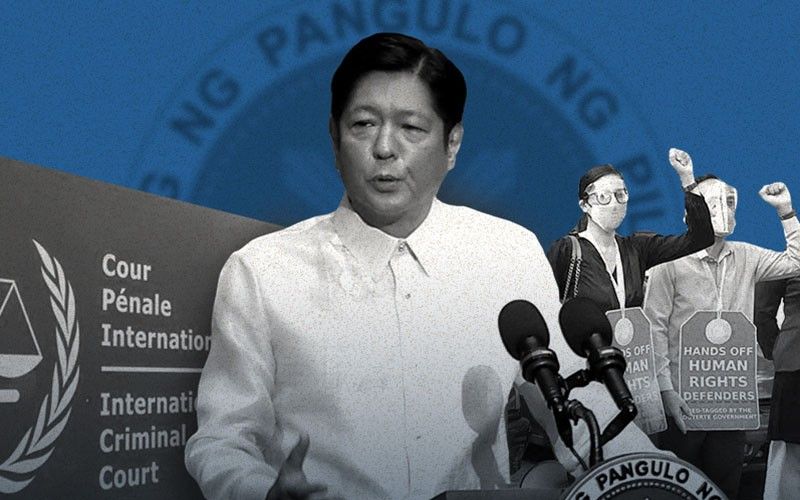In first 100 days in office, Marcos rejects hopes for Philippines rejoining ICC

MANILA, Philippines — A month into his six-year term, President Ferdinand “Bongbong” Marcos Jr. made clear that the Philippines will not rejoin the International Criminal Court, where victims of the past administration’s bloody “war on drugs” have pinned their hopes to find justice for crimes against humanity committed against their slain loved ones.
“The Philippines has no intention of rejoining the ICC,” Marcos declared in a press conference on August 1.
“The ICC said it wants to continue the investigation but we’re telling them that we already have an ongoing investigation here at home so why would there be a need for that?” Marcos added in Filipino.
READ: Duterte announces Philippines' withdrawal from ICC
This is despite Marcos having told the UN Representative to the Philippines, Ambassador Gustavo Gonzalez on June 10 — when the former was still president-elect — the “importance of ensuring high-level of accountability in terms of human rights [violations].”
In an official reply, the Philippines through a submission prepared by Solicitor General Menardo Guevarra asked the court's Pre-Trial Chamber to deny the ICC Prosecutor Kharim Khan's request to proceed with the investigation.
Philippine officials insisted: The ICC has no jurisdiction over the situation in the Philippines and complaints filed before the international tribunal are already being investigated by agencies — this means the State “is neither unwilling nor unable to carry out these domestic proceedings.”
Khan however rejected the Philippine government’s arguments and pushed for an on-ground investigation into the allegations crimes against humanity committed in the country.
For the families of the victims of the bloody “war on drugs,” the Philippines not rejoining the ICC “could prove to be a costly miscalculation,” their legal counsel said.
Lawyer Kristina Conti said former President Rodrigo Duterte, with his anti-people policies, has brought death and destruction. And this “has opened the doors wide for impunity, frightfully normalizing that the worst criminals are in uniform.”
With his successor Marcos opting not to return to the ICC, the incumbent president “[deprives] ordinary Filipinos of an opportunity and a last resort for crimes against humanity, which most usually are crime committed by the State or massive political forces.”
“His position that the domestic system provides complete justice recalls of how his own family evaded it in the Philippines,” she added in a message to Philstar.com.
“Should Marcos also choose not to cooperate with the international court’s investigation supported and called for by many Filipinos, he will contend with a political storm with international impact,” she warned.
Marcos government makes an appearance at UNHRC
The Marcos government made its first appearance before the United Nations Human Rights Council at its 51st session where Justice Secretary Jesus Crispin Remulla, on October 5, claimed the government is “undertaking transformational reform of its justice and law enforcement sectors.”
He touted that anti-illegal drug campaign has been refocused to tackle the source of the problem, and the need for rehabilitation, prevention, education and assistance to victims and their families.
Remulla also highlighted the Department of Justice-led review panel that looked into the Duterte administration’s “war on drugs.” He said seven incidents involving deaths have been filed before courts, where 25 cops have been charged. The National Bureau of Investigation is also handling 302 cases for their case buildup.
But ICC Prosecutor Khan earlier called the touted DOJ Panel Review as an administrative “desk review.”
Human rights groups also said that "war on drugs" killings, red-tagging of rights defenders and government critics, and other violations continue without let up.
“The human rights situation in the Philippines remains dire. Domestic remedies remain largely ineffective in pursuing successful prosecution of perpetrators of extrajudicial killings and other violations,” Karapatan secretary general Cristina Palabay said in an oral statement delivered during the council’s session.
On local shores, attacks vs lawyers, journalists continue
In the first 100 days of the Marcos administration, attacks against lawyers, which saw a rise in the previous Duterte administration, also continued with the red-tagging and threats thrown by former Palace official Lorraine Badoy against a Manila judge.
Badoy, also former spokesperson of the government anti-insurgency task force, posted a series of statements on her Facebook ranting against Manila judge Marlo Magdoza-Malagar who junked the government’s petition to judicially declare communist rebels as terrorists.
The judge said that crimes alleged in the petition are violations of the law but do not fall under terrorism as defined by the Human Security Act — which has since been repealed by the feared Anti-Terrorism Act of 2020.
Badoy’s threat to Magdoza-Malagar drew the ire and condemnation of judges and lawyers across the country, and even prompted a motu proprio (on its own) proceedings at the Supreme Court that eventually issued a show cause order against the former Palace official.
But when asked at Palace briefing on September 27 on Badoy’s posts, then-Press Secretary Trixie Angeles-Cruz only said: “As you know this administration will adhere closely to the rule of law and only to the rule of law. We do not endorse any illegal activities.”
Cruz-Angeles added they rely on Remulla to refile the proscription case against the Communist Party of the Philippines and the New People's Army based on the Anti-Terrorism Act of 2020 before the Court of Appeals.
Earlier this week, radio broadcaster Percy Lapid — whose real name is Percival Mabasa — was shot dead in front of the gates to a Las Piñas City subdivision. He was the second journalist killed since the start of the Marcos administration, following the murder of Negros Oriental broadcaster Rey Blanco in September.
Alarms were also raised that the latest killing of a journalist happened within Metro Manila, which signals the brazenness of the perpetrators of the crime.
READ: Percy Lapid’s family hopes Marcos lends ‘louder’ voice to calls for justice
The president himself did not give a statement on the killing of Lapid, and his press secretary, who doubles as his spokesperson, quit her post the same day. But Deputy Executive Hubert Guevarra told reporters at the Palace on Tuesday: “The Office of the President, particularly [Marcos], is concerned (over) what happened to Percy Lapid. In fact, we have been instructed to take a look at the conduct of the investigation on the ambush.”
The president later delivered a speech at the Manila Overseas Press Club but did not make mention of Lapid’s ambush. He however made a general vow to “support and protect the rights of the media.”
Read other explainers on Marcos' first 100 days:
- After series of resignations in first 100 days, are cracks emerging in Marcos’ unity?
- The first 100 days of Marcos: Where is our transportation heading?
- Marcos' 1st 100 days: Still no health chief, eased mask rule
- In charts: The Philippine economy 100 days into Marcos presidency
- How Philippine stocks performed in Marcos' first 100 days
- Latest
- Trending































